![]() 1st Battalion 22nd Infantry
1st Battalion 22nd Infantry ![]()
Soldier Profile: Tony Tantillo
Company A 1st Battalion 22nd Infantry
1941-1944
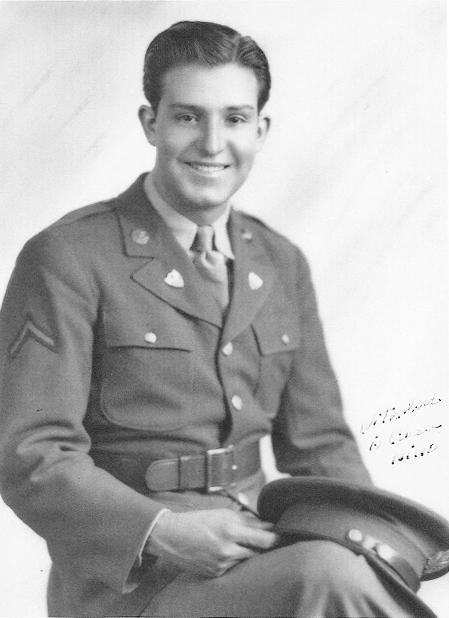
Tony Tantillo
Antonino "Tony" Tantillo was born in Palermo, Sicily in 1918.
His father immigrated to the
United States in 1923. Nine years later his father became a U.S.
citizen and sent for his family in Italy.
In April 1932 Tony came to the United States with his mother,
older brother Bartolomeo (Bartholomew) and his younger brother
Agostino (August) aboard the Italian Ocean Liner S.S. Saturnia
which sailed from Naples, Italy.
In the 1940 census he was
recorded as living in Queens, New York with his father and
mother, two brothers
and sister in law. Tony couldn't speak English when he came to
the U.S. but learned the language quickly
as he had a "good ear" for it.
Tony was drafted into the Army on February 17, 1941 at Jamaica, New York (not in 1939 as the article posted below states.)
After induction at Camp Upton,
New York he was sent to Fort Benning, Georgia and assigned to
Company A 22nd Infantry.
He was with his Company in the Louisiana maneuvers of 1941 and
served in the Company for over a year and a half when the
leader of the Regimental Band observed Tony playing guitar and
recruited him for the Band. He played in the Band for about a
year at USO clubs and in several concerts. He also played cymbals
in the marching band on occasion. Just before the Regiment
deployed overseas Tony rejoined Company A as a rifleman.
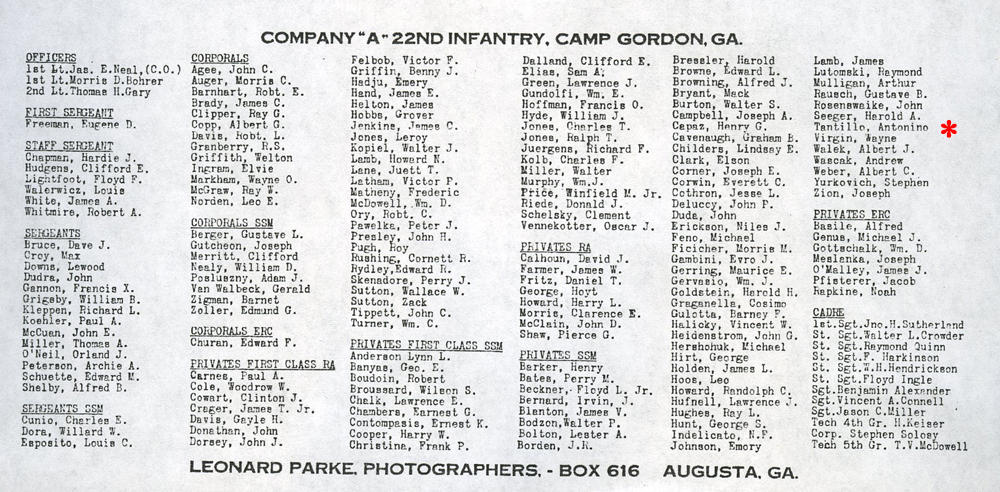
Above: The list of names
in a Company photo of Company A 22nd Infantry taken at Camp
Gordon, Georgia ca. 1942-1943.
Tony Tantillo's name is marked by a red asterisk in the column on
the far right.
He is listed as a Private in the SSM category indicating he was
drafted into the Army.
Photo courtesy of John
Gervasio,
son of William Gervasio, who served in
Company A 22nd Infantry 1941-1945
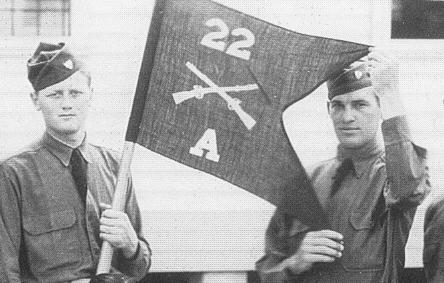
Above: Tony Tantillo on
the right holding the guidon for Company A 22nd Infantry.
Photo taken at Camp Gordon, Georgia ca. 1942-1943.
Photo courtesy of John
Gervasio,
son of William Gervasio, who served in
Company A 22nd Infantry 1941-1945
|
Left: Partial roster of Privates Tony Tantillo's name is marked The following month the 22nd
Infantry From a Christmas Dinner menu |
Tony served with the 22nd
Infantry at Fort Benning, Georgia; Camp Gordon, Georgia; Fort
Dix, New Jersey;
Camp Gordon Johnston, Florida; and Fort Jackson, South Carolina.
He was awarded the Good Conduct
Medal in Headquarters 22nd Infantry General Orders No. 5 dated
June 8, 1943
at Fort Dix, New Jersey.
He sailed with the Regiment to England in January 1944.
During his time off from
undergoing training in England he hung around with his younger
brother August, who was
stationed at the time at Bristol, England in the U.S. Army Signal
Corps. By the time Tony crossed the English Channel
headed for France he had already been promoted to Private First
Class.
Tony landed on Utah Beach on
D-Day June 6, 1944 and fought in Normandy through heavy action as
his Company attacked
the German coastal battery positions at Crisbecq and the
defensive line at the Quineville Ridge. On one occasion he
captured
two Germans who surrended to him and turned them over to his
Headquarters.
He was awarded the Combat
Infantryman Badge in Headquarters 22nd Infantry General Orders
No. 16 Paragraph 3
dated November 11, 1944, with an effective date for him
personally as June 7, 1944.
On June 17, 1944 Tony was
seriously wounded in action and evacuated from the battlefield.
Before long he was sent to
a hospital in England and then to a convalesence center where he
underwent rehabilitation in preparation to being sent back
to his unit. After several months he was about to return to
Company A but became violently ill and hospitalized for malaria
with complications of pneumonia. It was determined he was unfit
for front line service and remained in hospital until being sent
back to the United States in January 1945.
He was in recovery in a hospital in Nashville, Tennesee and then was transferred to a hospital in Augusta, Georgia.
On June 17, 1945 Tony was discharged from the United States Army at Fort Dix, New Jersey.
A son reflects upon his father
Tom Tantillo the son of Tony Tantillo wrote the following in reflection upon his father's life and service:
He has never spoken much about
his service; particularly the landing on D-Day. Two very specific
times when I myself as a young man
wanted to know about his experience on June 6th, he would start
and when he got to this one particular part in the story, when he
remembers a sniper's bullet traveling past his right ear....he
would say "I felt it miss me and I fell down onto the wet
beach and was told
by my captain, if you are still alive lay there and let the water
push you up closer to the wall." He would stop, talk no
more, take out
his handkerchief because his eyes were full of tears, and look
far away. This puzzled me then, but is completely understood now
as I have learned more through my readings and learnings of these
great heroes and D-Day.
Here is his story as I have collected it over the span of my
life.
Dad was drafted into the army in 1941 and was, as he says
"serving his time to be discharged," and then the US
experienced the
horrific attack on Pearl Harbor… well all things for every
person in the US changed Sunday Morning December 7, 1941.
And as dad recalls President Roosevelt's proclamation to the
world it was "a day that will live in Infamy." He was
sent to Fort
Benning and later to Camp Gordon where he met my mother at the
USO. They fell in love and were married July 5, 1943 at Sacred
Heart Church in Augusta... July 10th back at Camp Gordon he
prepares to ship out to Tallahassee FL before Thanksgiving for
landing craft beach training and from there back to Fort Jackson
before Christmas. From there they went to NY City where he
ships out from its harbor to Great Britain in January,1944 with
the rest of the 4th Division in preparation for D-Day. Dad was in
the
Army Camp Band and went from playing a musical instrument back to
carrying an M-1. Welcome young man to Uncle Sam’s Army.
For almost a ½ year they prepared for the impending
invasion…. Dad’s stories are few as he has never cared
to talk in any detail
about this period of his life. I know he was deeply homesick as
he and mom wrote to each every week…. and I am sure more
times
than just once every week. He took his training in England and
while there he was able to see his brother Auggie once, who had
signed up for the ARMY the day after Pearl Harbor and then after
Basic & AIT was sent to the UK as well for his training. They
were
able to meet each other this one time in harbor town of Plymouth,
England to have dinner together at a pub. If there is one thing
he recalls
more often than any other in his stories is the lack of food and
the general poor quality of ARMY food if and when there was any
to be had.
He says he was only 170 lbs. when he made the landing. While at
the pub they commandeer a couple of string instruments and began
to play, the customers and proprietor were so delighted with
their performance that he offered them the best meal in town he
had and it was
"on the house"; scrambled eggs and toast. Dad says
it’s the best damn eggs and toast he ever tasted. This was
the last time dad saw
his brother until the end of the war.
Operation Overlord Normandy, France
D-Day 07:30 hours June 6, 1944
US ARMY 4th Division, 22nd Infantry, 1st Battalion, Company A
Utah Beach
(A very short story)
One Soldier's Invasion of Normandy
Before departing for the French coast on the morning of June 6th
dad remembers having to get up early, very early. Not shaving and
being wet & cold. It was dark. In full gear, he stood his
place in line for powdered eggs, a piece of cheese, 2 slices of
untoasted bread
and some luke warm coffee. Then it began to sink in. Up until
that moment he said did he know this was going to be D-Day!
As their troopships came into view of the coast of France he says
they began to climb overboard & load into the landing crafts
35-40 men each. There was a few hundred or so of these being
prepared as the first wave for their approach to Utah Beach.
He could hear the screams of the shells from the NAVY guns as
they passed over head towards their targets on the cliffs and
hillsides. He says worst you could see & smell the smoke of
the gunpowder from the exploding shells which choked filled the
air…
he says he remembers fighting back the tears of fear. Each
Company was loaded into their crafts in alphabetical order; A
Company
first then followed by B and so on, so the Higgins Boat he was on
followed Company B’s boat. There were 60-70 maybe 100 men
wounded and dead in the water and on the beach when they landed.
When his boat stopped and the ramps let down, men began to push
each other to rush out. Dad says they were in moderately
deep water about waist high and it was a real struggle to get a
footing. At this point in the story he will always stop and
begins
to cry… tears streaming down his face and with trembling
voice he says very quietly trying to choke back the tears
"…almost
immediately the man to his right and the man to his left were
killed." They knew there were snipers on the hill and as he
felt a bullet
pass his right ear, he fell into the water. His captain yelled if
any of you are still alive stay down and let the tide push us up
to the wall!
He did he believes for 10-15 minutes until the tide pushed him up
onto the sand. He doesn’t know how but he survived his first
day
of fighting the war against Nazi Germany. I will always remember
the look on his face when he tells this the story, one almost of
guilt.
"Why he quietly asks, why them and not me?"
He remembers the sound of the Nazi MG 42 machine guns and the
explosion of the 88mm mortar rounds that lifted him up
off the beach and slammed him down, the sight of the pill boxes
on fire and the screams of dying men. He remembers that
sometime later that morning the sound of Patton’s tanks
struggling to beach themselves at low tide. He was on his way to
Cherbourg. They were able to get in a couple miles before dark.
He remembers there was no lunch or supper that day.
He remembers the next morning dead paratroopers hanging in trees.
He’s still crying.
12:30 D-Day afternoon, his brother Auggie lands on Normandy 5
hours behind his big brother; both men now fighting the Nazi war
regime.
One week or so later dad’s assigned rear guard for his
platoon and two Nazi’s step out of the woods behind him. As
he turned
they threw down their weapons and threw up their hands, "We
surrender" they shouted. He says more like they pleaded.
"They could have killed me" he says. "Instead they
surrendered?" he says almost questioning why (? ) adding
only more whys
to the 1000s he’s already collected and will never be
answered. He feels even today that they wanted to be captured by
the
Americans and not have to face the Russians. When he brought
these two prisoners into Company formation, his squad leader said
"Tantillo, take them and kill them." Dad was so shocked
he stood there and said nothing. Staring at his superior in
disbelief,
the squad leader said "You heard me GD. Go shoot ‘em.
We are not taking prisoners." Dad said he wouldn’t; he
couldn’t….
Then he was told that if he didn’t he would have to take
them back to the beach, which he did, actually it was 6 miles
back
to a collection point setup to hold prisoners who were then sent
to England, and many eventually came to America. I have said
to my father, dad if there were any good at all in any of this,
there’re probably two Germans alive today because of you.
He remembers day rolling into night back into day. He recalls at
some point a man 38-39 yrs. old standing close to him who was hit
in the stomach by a "Bouncing Betty". Dad says it was
really a terrible wound that disemboweled him and a medic grabs
him, makes him
kneel down next to this poor guy, hangs a bottle of plasma on the
butt of dad’s M-1, and then looks up at dad and says
…"GD he’s dead."
It’s now a week or so later. The day is June 17, 1944. They
stop to eat c-rations. They are in a field laden with dead farm
animals;
horses, cows & sheep. There is a shell blast and several men
are wounded & killed. Dad stands up to go help and the guy
next to him
grabs him and says "hey man you’re bleeding." He
was struck by a piece of shrapnel in his left hand; he
doesn’t remember being hit
or the pain of it. He is sent back to England, to the town of
Bristol to be treated. When he arrives his hand is already black.
He says they had just come out with Penicillin, he calls it his
"miracle drug." It saved his life. Almost healed &
convalesced he was
being scheduled to rejoin his outfit in France when a nurse asked
for his temperature be taken. She said are you feeling OK?
He said well enough; she said ...not well enough, I’m afraid
you’re not going anywhere you have a temperature of 104.
Dad had contracted pneumonia.
Later while recovering, a Major Flagg came to visit my
father… he asked him how long had he served.
Dad told him he joined in 1941 and made D-Day; that he was
married and his wife just had their 1st child. "Where are
you from solider?"
"Jackson Heights, Queens, New York, sir." Well answered
Major Flagg, "I am from Queens too and solider as commander
of this
hospital I have the authority to dismiss you and send you
home…. And I think its home you will go." Dad said
"... Major Flagg
if I live to be 100, I will never forget you!" Well we are
almost there and he has never forgotten this man who is an
adopted member
of our family today. At this point there are almost enough tears
to float the boat that took him across the Atlantic home to NY
City
for his third trip …. and then sent to the US ARMY Hospital
Nashville, TN.
Before being discharged from the Hospital in England, dad said a
Lieutenant walked into the collection ward and announced,
"Answer up when you hear your name called." After all
names were checked off… he said "there’s a Purple
Heart up here
for each one of you, pick one up on the way out;" and then
walked away.
He was honorably discharged from Fort Dix, NJ June 17, 1945
exactly one year after being wounded and given $250 back pay
for hazardous duty and sent home to North Augusta, SC.
He came home to North Augusta, SC, built our family home to start
his life, his family and his business; later to be joined by
his brother Auggie. Together they open a grocery store selling
can goods, fresh vegetables, meats and dry goods. They began
business in late 1945, early 1946. It was called Tantillo’s
Market and was on the corner of 11th & Gwinnett Street in
Augusta, GA.
Address 1102 Gwinnett Street.
Post Note: This story is a collection of many short stories that
I have kept from my talks with my dad. He's my hero.
Tom Tantillo June 16, 2017
Remembering D-Day invasion
Posted June 6, 2017 12:23 am -
Updated June 6, 2017 12:36 am
By Paul A. Harris , Ph.D. Guest Columnist
Today marks the 73rd anniversary of D-Day – a day when
156,000 Allied troops began the liberation of Nazi-occupied
Europe.
One of those brave souls is North Augusta’s Tony Tantillo,
who as a member of the U.S. Army’s 22nd Infantry Regiment
landed on the shores of France on June 6, 1944.
Born in Palermo, Sicily, in 1918, Tantillo emigrated to the U.S.
when he was 14. As he recalls, “Those very moments of
passing
the Statue of Liberty and seeing the night lights of New York
City glowing like thousands of diamonds is a sight I will never
forget.”
The Tantillo family lived in the Jackson Heights neighborhood of
Queens, and throughout the 1930s he and his younger brother,
August, were hired musicians playing in various venues throughout
New York City, including the occasional performance
at the Waldorf-Astoria.
Drafted into the Army in 1939 *, Tantillo was first assigned to A
Company, 1st Battalion, 22nd Infantry Regiment of the
4th Infantry Division – based at Camp Gordon. During his
time in Augusta, Tantillo would attend Catholic USO dances
held at Sacred Heart’s church hall. There he met the love of
his life – Clara Punaro, whose father, Egidio
“Edward” Punaro,
was the proprietor of Punaro’s Market on the corner of 13th
and Jones streets. Tony and Clara married on July 5, 1943,
and five months later his unit left for England in preparation
for the D-Day landing.
* (Website Editor Note: Tony was drafted in 1941 not in 1939.)
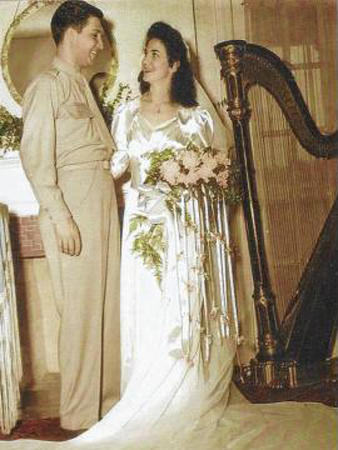
Tony and Clara Tantillo at their wedding July 5, 1943
Photo from the Augusta Chronicle
Military historians writing about the invasion note that probably
the most difficult of the 4th Infantry Division’s missions
were those
assigned the 22nd Infantry regiment. The regiment had the task of
knocking out heavily fortified gun positions overlooking Utah
Beach
on their way to securing the vital port of Cherbourg. As the
regiment’s after-action reports indicate, the Americans were
met with hard-nosed
resistance, and the fighting to take out the German positions
came at a steep price.
On the second day of the invasion, Tantillo’s battalion
commander, Athens, Ga., native Lt. Col. Sewell M. Brumby, nearly
lost his leg
and had to be medically evacuated. On June 8, Tantillo’s
company commander, Capt. Thomas C. Shields, was killed in action
and
posthumously was awarded the Distinguished Service Cross for
organizing the retreat of his men and directing artillery fire on
enemy
positions, thereby saving the entire company.
If that were not enough, on June 10, Divison Commander Maj. Gen.
Raymond O. Barton relieved the regiment’s beloved commander,
Col. Hervey A. Tribolet, for not being able to break the stiff
German resistance. According to 22nd Infantry Regiment Society
historian
Michael Belis, the German resistance was far heavier and better
organized than the planners realized – and “the 22nd
Infantry Regiment
never had a chance.” (Website Ed.: "Never had a
chance" ... of taking their objectives by the pre-Invasion
planned dates.)
On June 17, Tantillo nearly lost his right hand to shrapnel from
a German 88-mm artillery shell, and he had to be medically
evacuated.
After a year of recovery Tantillo was honorably discharged from
the Army on June 17, 1945, having earned a Purple Heart
and the Combat Infantryman’s Badge. Shortly thereafter, he
returned to North Augusta, where he and his wife raised nine
wonderful children, helped establish Our Lady of Peace Catholic
Church and started his own business – Tantillo’s Market
–
on Laney Walker Boulevard. He rarely, if ever, spoke of his
combat experiences.
Reflecting on the sacrifices made by Tantillo and his fellow
D-Day veterans, legendary CBS journalist and Army combat
correspondent Andy Rooney declared: “If you think the world
is rotten, go to the cemetery of St. Laurent on a hill
overlooking
the beach and see what one group of men did for another on D-Day,
June 6, 1944.”
The writer, a native of North Augusta, is a professor of
political science and associate director
of the Honors College at Auburn University.
From the Augusta Chronicle
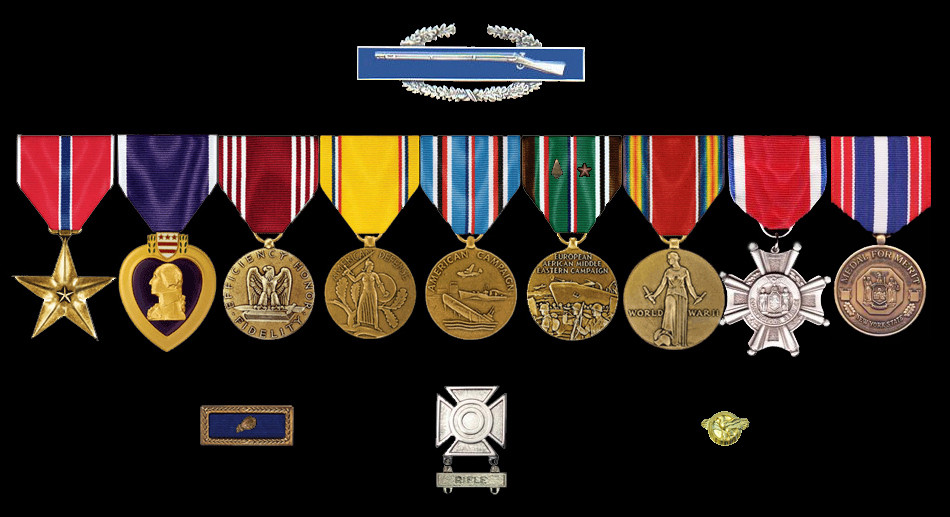
Tony Tantillo's decorations
Top: Combat Infantryman Badge
Center left to right:
Bronze Star Medal, Purple Heart, Good Conduct Medal, American
Defense Service Medal,
American Campaign Medal, European-African-Middle Eastern Campaign
Medal with arrowhead and bronze service star,
World War II Victory Medal, State of New York Conspicuous Service
Cross, State of New York Medal of Merit
Bottom left to right : Presidential Unit Citation with oak leaf cluster, Sharpshooter Qualification Badge Rifle, Honorable Service Lapel button
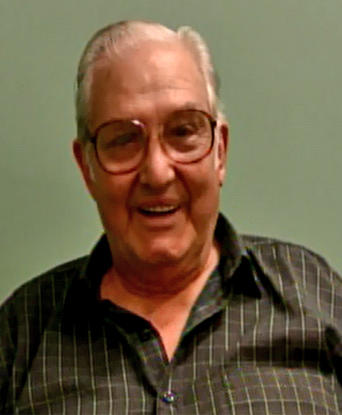
Antonio "Tony" Tantillo at
age 90
Photo taken September 10, 2008 at Aiken, South Carolina
From his interview for the Veterans History Project
Courtesy of Dr. Paul Harris
Sunday, May 6, 2007
Tale of two Italians shows interesting
facet to a long-simmering debate
By Paul A. Harris, Ph.D.
Guest Columnist
The United States has always been of two minds regarding
immigration. On the one hand, we are a country built upon the
immigrant ideal:
a "shining city upon a hill" where millions of
oppressed peoples from throughout Europe, Asia and the Levant
left their countries of birth
and adopted a new homeland. On the other hand, immigration has
been a continual source of political and social conflict.
In the 50-year period between 1875 and 1925, more than 24 million
immigrants - mostly from Eastern and Southern Europe; Russian
Jews,
Polish and Italian Catholics - resettled on these shores. Like
the earlier wave of Irish, these immigrants were poor, landless
peasants lacking
advanced degrees, possessed few skills and lived in squalid
overcrowded slums. But unlike the Irish, these new immigrants
spoke no English
upon arrival.
Italian immigrants were an especially detested group. Newspapers
and prominent politicians such as Sen. Henry Cabot Lodge of
Massachusetts
described Italian immigrants as an "unassimilable mass which
drank to excess, lived in filth, and at the slightest provocation
went for the stiletto.
The remedy was simple: keep them out!"
ANTI-IMMIGRANT supporters of that time emphasized the differences
between older and newer immigrants. Germans, they argued,
were thrifty and industrious; Italians, however, did not want to
learn English, and were clannish and criminal.
By the early 1920s, the call for immigration restriction was so
strong that in 1924 the Johnson-Reed Act was passed
which effectively closed America's borders.
And it is within this context of anti-immigrant hysteria fomented
by the most abhorrent diatribes that two Italians - Tony Tantillo
and Anthony Alaimo - made the transatlantic passage.
Born in Termini in 1920, Alaimo arrived in the United States in
1922. Tantillo, who was born in Palermo in 1918, immigrated to
the U.S.
as a teenager during the depths of the Great Depression in 1932.
In addition to their native land of birth, both men shared a
similar fate
as both would face - and overcome - deeply held anti-Italian
prejudice to become decorated veterans who fought valiantly for
their
adopted homeland during World War II.
A member of the storied 4th Infantry Division, Tantillo made the
initial landing on Utah beach on the early morning of June 6,
1944 - D-Day.
On the evening of June 5, Tantillo shook hands with British Gen.
Bernard "Monty" Montgomery, who asked him where he was
from.
When Tantillo answered "Augusta, Georgia, sir,"
Montgomery responded, "I'd like to visit that town one
day." Tantillo fought with
the "Ivy Division" until he was severely wounded in
combat on the outskirts of Cherbourg, France two weeks later.
Alaimo was a bomber pilot on a mission over the Netherlands when
he was shot down in 1943. Badly wounded, Alaimo was the only one
of his crew to survive the crash, and was taken as a POW. While
confined, Alaimo assisted his fellow POWs in a daring breakout -
an event depicted in the movie The Great Escape.
AFTER THE WAR, Tantillo and Alaimo returned home and like the
millions of veterans of their generation got on the business
with raising families and pursuing careers
Tantillo, who met his wife, Clara, at a USO dance while stationed
at Fort Gordon, made North Augusta, S.C., his home and founded
Tantillo's Grocery on Laney-Walker Boulevard, where he served the
community for nearly 50 years. He and Clara helped establish
Our Lady of Peace Catholic Church and raised nine children - the
youngest who was President George Bush's undersecretary of state
for textiles and trade from 1989-1993.
After graduating from Emory Law School in 1948, Alaimo practiced
law in Atlanta until settling in Brunswick in 1957. An early
stalwart
of the State Republican Party, Alaimo was nominated for a federal
judgeship by President Nixon in 1971, where he has served the
Southern District since. In 2005, Alaimo received Georgia State
Law School's highest honor, the Ben F. Johnson Lifetime
Achievement Award.
In our current immigration crisis, the harsh treatment meted out
at earlier waves of immigrants such as Italians often goes
unnoticed.
Today these same nativist frustrations on newcomers from Latin
America can get the best of us. Tony Tantillo and Anthony Alaimo
are a testament to the ability of this country to absorb and
assimilate newcomers - their exemplary lives embody the promise
that
the United States is still is that "shining city upon a
hill."
(Editors note: The writer is an associate professor of political
science, and director of the Center for Immigration Studies,
at Augusta State University.)
The Augusta Chronicle
The following is the story of the roots of the family of Tony Tantillo as written by his son Tom:
My father was Born the third of
five children in Palermo, Sicily to parents Pierina LaBarbera and
Tommaso Tantillo on July 19, 1922.
Only three of the five children survived to adulthood,
Bartholemeo [Bart], Antonio [Nino or Tony, my father]
& August [Auggie as he was always known]. Two other Children
died at childbirth.
My Grandmother was from the mountain region of Sicily, the small
town of Mezzojuso which is 37 km northeast of Corleone,
and was born February 9, 1889. My grandfather was born in
Palermo, Sicily November 4, 1870.
THE STORY
Two brothers married two sisters. My grandfather married my
grandmother and his brother married her sister. However the men
from the village were disallowed the social company of or to meet
& associate with the women of the mountains. Mezzojuso is one
of the wine and cheese producing areas of Sicily where its
inhabitants are almost tribal. My grandmother’s family
raised sheep and
cattle for their milk, which was made into cheese, and maintained
vineyards on the side of their mountains to grow and harvest
grapes
for their small winery. Even now for more than 250 years they
still own livestock, till in their vineyards and work their farm
to make
wine and cheese today. I have been there and it’s
magnificent. But as a result of this marriage, village men
marrying mountain women,
the families on both sides disowned them and disallowed them
rights to visit or return to their homes after their weddings.
My grandfather and grandmother
moved back to live and make their home in Palermo where he served
briefly in the military and later
became a stone mason by trade; my father was born there. His
uncle and aunt stayed in Mezzojuso and tended their vineyards and
farm animals. The family from the mountain and the family from
the village on either side never saw, spoke or associated with
each other
for over 70 years until my mother and father returned to Palermo
in 1975 to visit with their cousins. Learning their American Son
was
returning home, the family in Palermo planned a 3 day
celebrazione in the small village town where he was born in the
Palermo.
On the second day of the
celebrazione, or celebration, the men & women from the
mountains came on mules & horses down to the
village claiming that “Nino” was their Son as well.
They brought fresh skins full of spring wine, lemons, olives,
cheeses, breads of all sorts
and salami’s for all to enjoy. Dad said that night sitting
at the tables heavy with pastas, roasted lamb, braised goats,
minestrone galore;
breads of every type, wine and cheese… the men of the
village began to challenge the men from the mountains to a
singing contest
of the songs of Italy & the arias from Puccini and Verdi,
each family taking turn by standing on the table and singing to
the top of
their lungs; and as the singing and drinking went well into the
morning hours and the two families most too young to understand
or
even know why there was an unspoken silence for the other; became
one family for the 1st time after 70 years of distance,
dis allowance & disowned.
My grandfather on my father side immigrated to the US in 1923 to
New York City. He had to come alone first as it was required
at that time that he had to be naturalized and have a proven
savings of $300 before he was allowed to bring any of his family
to the States.
During his registration process at Ellis Island he was asked if
he ever been imprisoned. He had and he answered so. Not truly
understanding
what or why he was being asked, he was detained without
explanation on Ellis Island and was scheduled to be deported back
to Sicily
within the week. His cousins who had come to meet him were
confused as to why he was being detained. After many attempts to
speak
with Immigration Authorities, they were told that he was being
held for deportation due to admitting having a jail sentence in
Sicily.
The cousins agreed this was true. He was imprisoned for three
days as a young soldier for speaking against Mussolini. Well this
quickly changed his status and he was released and allowed to
complete his immigration. It was the experience of being
imprisoned
in Sicily that finalized his decision to do everything he could
to take his family and move to the US. This was in hopes to
survive what
he understood to be a certain eventuality, another World War so
the Tantillo migration to the US started in 1923.
My father and his mother and two brothers left Palermo, Sicily
April 14, 1932 and docked at the 59th Street Pier April 27th.
They arrived
on the Italian steamer the SATURNIA. Dad still recalls those very
moments of passing the Statue of Liberty. Even though it was
early evening and the night lights of New York City were already
glowing like thousands of diamonds; as a child of 14 he was
forever
impressed and says it is a sight he will never forget. I cannot
listen to this story enough, and each time he tells it,
when he wells up with tears so do I.
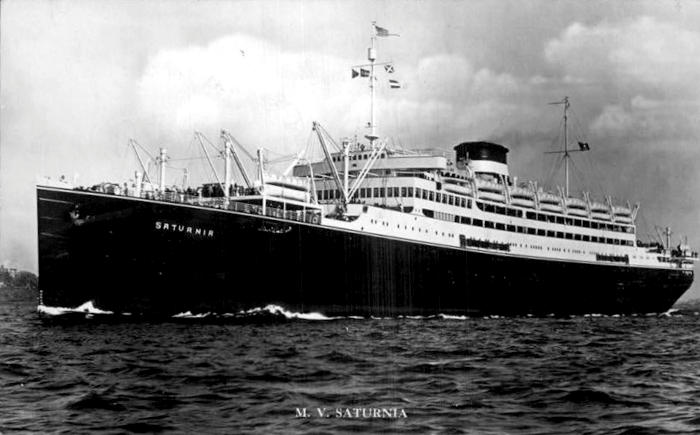
The Italian passenger ship Saturnia
My grandfather was a tile mason in NY City and worked six &
seven days a week in many of the new skyscrapers that were being
built
at that time. The family lived in Jackson Heights, Queens and as
a young boy dad worked for his uncle who had a produce warehouse
and delivered fresh vegetables to the street stands and small
grocery stores that dotted each corner and lined every avenue of
the City
that never slept. Later as a young man, dad got his first regular
paying job in a shoe factory owned and operated by an Italian
also
from Mezzojuso. His older brother Bart was a barber and Auggie,
too young to work, hung around the produce warehouse cleaning
and stacking and unloading-loading the vegetables that came to
them day and night.
As young men dad, a guitarist and his brother Auggie, a
mandolinist were hired musicians in New York City and played many
venues.
One of his favorite recollections was the occasional performances
at the Waldorf Astoria Hotel on Park Avenue. He would say
that they not only paid well, you also got a sit down all you can
eat steak and potato dinner.
On January 9, 2018 Tony Tantillo
celebrated his 100th birthday.
In April 2018 the Army fullfilled Tony's request to have his
personnel file updated
and authorized and sent him decorations missing from his file
since the war.
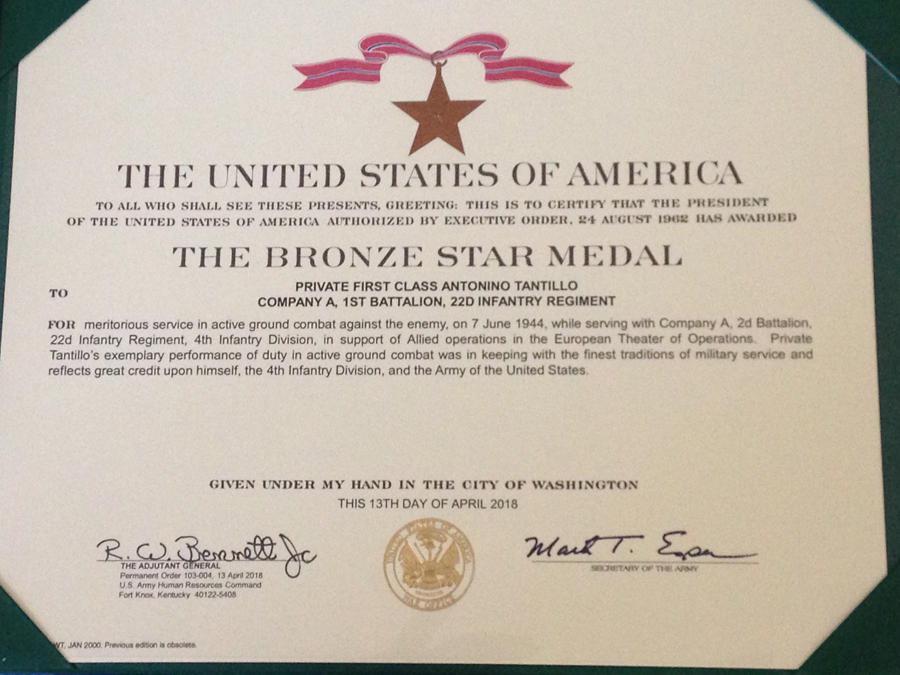
Above: The certificate awarding the Bronze Star Medal to Tony Tantillo
Courtesy of Tom Tantillo the son of Tony Tantillo
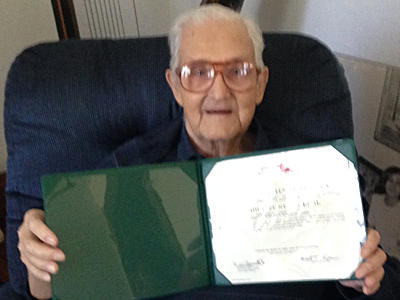
Tony Tantillo holding the Bronze Star Medal certificate April 2018
Courtesy of Tom Tantillo the son of Tony Tantillo
|
Awards sent to Tony Tantillo by the Army in 2018 for his service during 1941-1945.
Left to right: Bronze Star Medal and
Presidential Unit Citation with oak leaf cluster, American
Campaign Medal,
European-Middle-Eastern African Campaign Medal with arrowhead and
bronze service star,
World War II Victory Medal
Courtesy of Tom Tantillo the son of Tony Tantillo
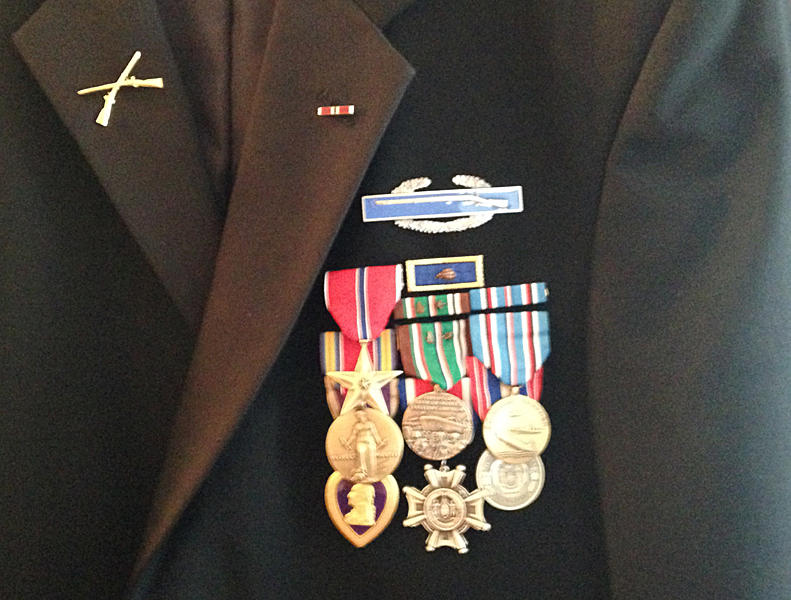
Tony Tantillo's tuxedo with several of his awards on it
Courtesy of Tom Tantillo the son of Tony Tantillo
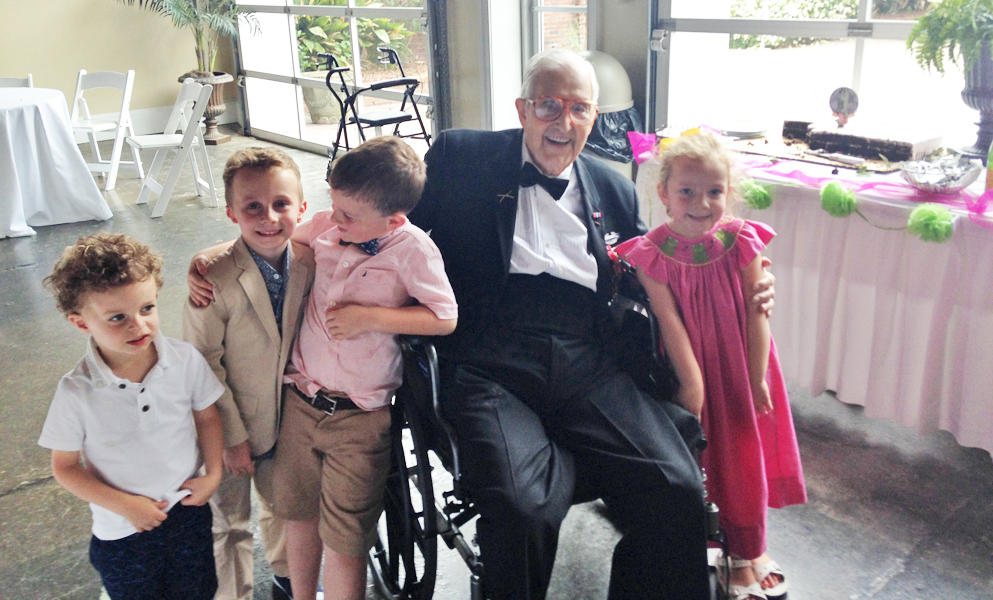
Tony Tantillo at his 100th birthday celebration with his great grandchildren
Courtesy of Tom Tantillo the son of Tony Tantillo
Tony Tantillo passed away on February 28, 2019. The following is his obituary:
The Mass of Christian Burial for
Mr. Anthony Tantillo, 101, who entered into rest February 28,
2019, will be conducted Saturday,
March 9th, at 11 o'clock from Our Lady of Peace Catholic Church.
Reverend J. Renaurd West celebrant. Final Prayers and
Commendation in Westover Memorial Park with Veterans Honors.
Mr. Tantillo was a native of Sicily, having made North Augusta
his home for the past 74 years. He was a communicant of
Our Lady of Peace Catholic Church where he had served in the
Choir and was a member of the Knights of Columbus.
Mr. Tantillo was a member of the "Greatest Generation"
as a US Army Veteran of World War II having received
the Bronze Star and Purple Heart. He was the retired owner of
Tantillo's Market in Augusta.
Survivors include his wife of 76 years, Clara Punaro Tantillo;
four sons, Thomas Tantillo, Evans, Anthony Tantillo and
Mario Tantillo both of Atlanta and Auggie Tantillo, Burke, VA;
five daughters, Nina Mahal, North Augusta, Madeleine Meyerson,
Mt. Pleasant, SC, Antoinette Paradiso, Montclair, NJ, Angela
Tantillo, Glen Ridge, NJ and Teresa Tantillo, Atlanta;
13 grandchildren and six great grandchildren.
Honorary Pallbearers will be Joseph Tantillo, Anthony Thomas
Tantillo, David Myerson, Charles Mahal, Kevin Tantillo
and Anthony Paradiso. Active Pallbearers will be Edward Samulski,
David Samulski, Peter Samulski, Philip Samulski,
Richard Samulski, John Samulski and Joseph Samulski.
The Holy Rosary will be recited Friday afternoon at 4 o'clock
followed by visitation until 6 o'clock.
Memorials may be made to Our Lady of Peace Catholic Church, P.O.
Box 6605, North Augusta, SC 29861.
Posey Funeral Directors of North Augusta is in charge of
arrangements (803-278-1181).
Visit the registry at www.PoseyCares.com
Published in The Augusta Chronicle on Mar. 7, 2019
**********************
This page was created under the direction of
and because of the contributions by Dr. Paul A. Harris of Auburn
University.
The 1st Battalion website is grateful to Dr. Harris for his
efforts to honor this hero of the 22nd Infantry.
The website also sends its gratitude to Tom
Tantillo the son of Tony Tantillo for his undying efforts to
honor his father
and preserve his legacy.
Top photo of Private First Class Tony Tantillo
taken in England in 1944.
Note 22nd Infantry Distinctive Insignia on his coat lapels.
Photo courtesy of the Tantillo family by way of:
Paul A. Harris, Ph.D.
Associate Director &
Professor of Political Science
Honors College
Cater Hall
Auburn University, AL
Home | Photos | Battles & History | Current |
Rosters & Reports | Medal of Honor | Killed
in Action |
Personnel Locator | Commanders | Station
List | Campaigns |
Honors | Insignia & Memorabilia | 4-42
Artillery | Taps |
What's New | Editorial | Links |